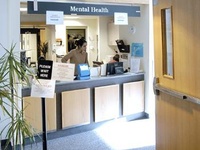“It’s not a problem if they talk to each other,” Hermann says.
But students who have sought help at UHS say coordination is often left up to patients, leaving students struggling with weighty problems to carry yet another burden.
Whitman says that seeing both a psychologist and a nurse practitioner created confusion when she wanted to discuss how her antidepressant was impacting her mental health.
She says her psychologist always referred her to the nurse practitioner when she wanted to speak about the medication, but the nurse practitioner referred her back to the psychologist.
“You can’t separate how you’re feeling from medication which alters brain chemicals and moods,” Whitman says. “There’s really no way to separate how you’re feeling from the medicine.”
Kadison says this year clinicians have started to have weekly team meetings to discuss student care.
But Mental Health Advocacy and Awareness Group Co-Chair Caitlin E. Stork ’04 calls the split care system a “quick fix.” Even the best communication between two clinicians cannot equal the benefits of seeing just she says, one person.
“Private, traditional psychiatry where they provide both medication and therapy—that’s the best way it works,” says Stork, who was diagnosed with bipolar disorder when she was 15 and now takes medication to control it.
Kadison says that UHS sometimes has the prescriber also perform therapy if there are “clinical reasons” to warrant that.
In interviews with 24 students who had visited UHS for mental health problems, only one student received both medication and therapy from the same clinician—a nurse practitioner.
Nursing the Problem
Some students and mental health experts say that this system—which sometimes leaves sole care for a student’s mental health in the hands of a nurse practitioner—is short-changing patients to reduce costs.
On top of their bachelors or associates degree, nurse practitioners must spend one to two years in graduate school for a masters.
An adolescent psychiatrist has nine to ten years of training—four years of medical school, one year of general residency training, two to three years of residency training in general psychiatry and two years of training in psychiatric work with adolescents.
Whitman says she felt the nurse practitioners she saw did not have enough training to make decisions about medication.
Read more in News
Chapel May Remain in Cambridge Permanently














